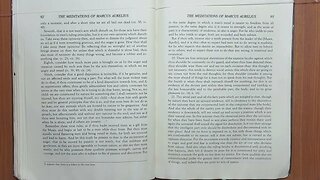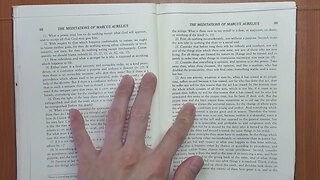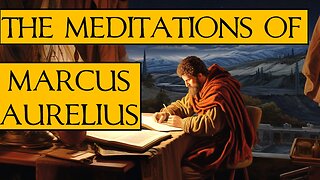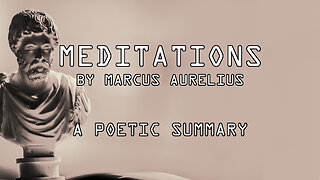Meditations of Marcus Aurelius 03 Translation G. Long 1993 Audio/Video Book (Stoicism) S03
Meditations of Marcus Aurelius 03 Translation G. Long 1993 Audio/Video Book (Stoicism) S03
A Practical Guide for Living in an Irrational World Translated by George Long
Amateur Audio Video Book Reading, Unrehearsed Book Reading Session
Check the playlist for the entire series. You can read along with me.
Start Date: 5/31/2023
** If you are the Book Publisher or Rights Holder & Don't Want These Videos Shared, Please Contact Me Directly for Immediate Action - Thank You. MyAnalogBooks (at) Gmail (dot) com **
Complete Playlist: https://www.youtube.com/watch?v=_8qznJmQ2qA&list=PLjDghraxn5eLQ8Z0vaJwQ7iTIjxooI9Af&ab_channel=AnalogVideoBooksReadwithMe
Publisher : Avon Books 1993
Paperback : 120 pages
Authors: Marcus Aurelius Translated by George Long
Marcus Aurelius Antoninus was born to an upper-class Roman family in A.D. 121 and was later adopted by the future emperor Antoninus Pius, whom he succeeded in 161. His reign was marked by a successful campaign against Parthia, but was overshadowed in later years by plague, an abortive revolt in the eastern provinces, and the deaths of friends and family, including his co-emperor Lucius Verus. A student of philosophy from his earliest youth, he was especially influenced by the first-century Stoic thinker Epictetus. His later reputation rests on his Meditations, written during his later years and never meant for formal publication. He died in 180, while campaigning against the barbarian tribes on Rome’s northern frontier.
While on campaign between 170 and 180, Marcus wrote his Meditations in Greek as a source for his own guidance and self-improvement. The original title of this work, if it had one, is unknown. 'Meditations' – as well as other titles including 'To Himself' – were adopted later. He had a logical mind, and his notes were representative of Stoic philosophy and spirituality. Meditations is still revered as a literary monument to a government of service and duty. It has been considered by many commentators to be one of the greatest works of philosophy.
It is not known how widely Marcus's writings were circulated after his death. There are stray references in the ancient literature to the popularity of his precepts, and Julian the Apostate was well aware of his reputation as a philosopher, though he does not specifically mention Meditations. It survived in the scholarly traditions of the Eastern Church, and the first surviving quotes of the book, as well as the first known reference of it by name ('Marcus's writings to himself') are from Arethas of Caesarea in the 10th century and in the Byzantine Suda (perhaps inserted by Arethas himself). It was first published in 1558 in Zurich by Wilhelm Xylander (né Holzmann), from a manuscript reportedly lost shortly afterwards. The oldest surviving complete manuscript copy is in the Vatican library and dates to the 14th century.
Stoicism is a school of Hellenistic philosophy founded by Zeno of Citium in Athens in the early 3rd century BC. It is a philosophy of personal virtue ethics informed by its system of logic and its views on the natural world, asserting that the practice of virtue is both necessary and sufficient to achieve eudaimonia (happiness, lit. 'good spiritedness'): one flourishes by living an ethical life. The Stoics identified the path to eudaimonia with a life spent practicing virtue and living in accordance with nature.
Alongside Aristotelian ethics, the Stoic tradition forms one of the major founding approaches to virtue ethics. The Stoics are especially known for teaching that "virtue is the only good" for human beings, and that external things, such as health, wealth, and pleasure, are not good or bad in themselves (adiaphora) but have value as "material for virtue to act upon". Many Stoics—such as Seneca and Epictetus—emphasized that because "virtue is sufficient for happiness", a sage would be emotionally resilient to misfortune. The Stoics also held that certain destructive emotions resulted from errors of judgment, and they believed people should aim to maintain a will (called prohairesis) that is "in accordance with nature". Because of this, the Stoics thought the best indication of an individual's philosophy was not what a person said but how a person behaved. To live a good life, one had to understand the rules of the natural order since they believed everything was rooted in nature.
Stoicism flourished throughout the Roman and Greek world until the 3rd century AD, and among its adherents was Emperor Marcus Aurelius. It experienced a decline after Christianity became the state religion in the 4th century AD. Since then, it has seen revivals, notably in the Renaissance (Neostoicism) and in the contemporary era (modern Stoicism).
#audiobook #videobook #education #worldhistory #stoicism #marcusaurelius #religion #philosophy #spiritualism #selfhelp #european #romanempire #rome
-
 16:36
16:36
Analog Video Books - Read with Me
9 months agoMeditations of Marcus Aurelius 17 Translation G. Long 1993 Audio/Video Book (Stoicism) S17
83 -
 21:47
21:47
Analog Video Books - Read with Me
9 months agoMeditations of Marcus Aurelius 18 Translation G. Long 1993 Audio/Video Book (Stoicism) S18
95 -
 5:16:04
5:16:04
Quest for Happiness
3 months agoMeditations by Marcus Aurelius - Audiobook | Philosophy | Stoicism 🏛️
5132 -
 5:28:03
5:28:03
Vox Stoica
4 months agoMarcus Aurelius - Meditations | Audiobook (my narration)
21 -
 10:25
10:25
vroland
5 months agoA Stoicism Guide by Marcus Aurelius: 9 Rules to Control Your Anger #meditations
67 -
 1:56:31
1:56:31
Legendary Lore
7 months ago'Meditations' by Marcus Aurelius - The Complete 12 Books on Stoicism in Today's Language
45 -
 1:33
1:33
TheBlackTortoise
10 months agoA Poetic Summary of Meditations by Marcus Aurelius
27 -
 5:17:22
5:17:22
Altrusian Grace Media
8 months agoTHRICE-GREATEST HERMES - VOL. 1 (Part 2) - G.R.S. Mead - Trismegistus Full Audiobook w/ Text
601 -
 6:03:37
6:03:37
Altrusian Grace Media
9 months agoTHRICE-GREATEST HERMES - VOL. 1 (Part 1) - G.R.S. Mead - Trismegistus Full Audiobook w/ Text
5181 -
![Meditations of Marcus Aurelius in Modern English [Full Book]](https://hugh.cdn.rumble.cloud/s/s8/1/5/M/T/O/5MTOp.0kob-small-Meditations-of-Marcus-Aurel.jpg) 2:47:00
2:47:00
VoxLegendi
3 months agoMeditations of Marcus Aurelius in Modern English [Full Book]
125